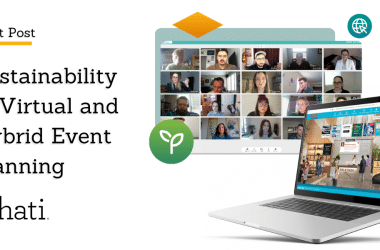Online community building with virtual events

Online Community Building with Virtual Events
Online communities enable worldwide connectivity and facilitate engagement in exciting ways, breaking down geographic barriers while increasing diversity, inclusivity, and connectivity.
Understanding how virtual events foster online community engagement is vital in today’s digital landscape. Virtual events help connect employees, employers, recruiters, academics, students, and people in almost any industry worldwide. Virtual event platforms are poised to use engaging environments to promote discussion, networking, and knowledge-sharing.
Here, we address the fundamental aspects of online community building and the role of virtual events in amplifying them, including:
- Defining online communities
- How virtual events have evolved
- Best practices and strategies for using virtual events to promote online communities
What are online communities?
Online communities can take many forms, making their definition variable. Generally speaking, online communities are personal or professional networks that serve as points of connection for global participants based on shared experiences, interests, or professions. Types of contact can include professional meetings, study groups, interest groups, video/text chats, forums, and informal ‘hangouts.’ The goal of any online community is to bring people together.
Fostering online communities vested in certain products and themes can benefit companies and brands. These include increased engagement, networking, feedback and expertise, social support, making connections, reduced support costs, and much more. Actively fostering online communities relevant to your brand and engaging in meaningful ways can build your brand personality and enhance your professional reputation.
Successful online community building hinges on several key elements. These include compelling content, strategic use of social media, positive reinforcement, guest posts, and, most importantly, authenticity. By embodying these elements, online communities can effectively foster diversity, inclusivity, and connectivity for individuals across the globe.
How Virtual Events Have Evolved
The evolution of virtual events in the digital age has enabled millions worldwide to connect and engage without the cumbersome task of traveling and finding lodging for events. Due to travel restrictions, the recent pandemic led to the rapid advancement of virtual event technologies and platforms.
There are many advantages of virtual events over traditional gatherings, with the most significant advantage being the significantly reduced carbon footprint due to the lack of venue and corresponding resources, including food, facilities, waste, and water. Additionally, the reduced travel for attendees and guests significantly reduces the event’s environmental impact.
After travel restrictions were lifted, it became clear that virtual event platforms could provide technological solutions for not only traditional events but also for the newly invigorated remote workplace. A workforce that now relies on online communities for collaboration, networking, and inspiration.
Today, virtual event platforms serve as alternatives to traditional in-person meeting venues but are also fluid spaces that can be adapted to the needs of variable online communities.
Best practices and strategies for using virtual events to promote online communities
Promoting virtual events to target audiences is essential for maximizing their online community-building potential. You want to target audiences who want to be engaged and immersed in your virtual space while sharing their knowledge and insight.
Encouraging participation and interaction during virtual events enables the online community aspect to take hold, accomplished through creating discussions, breakout rooms, and Q&A sessions.
Post-event engagement and follow-up strategies allow virtual event hosts to receive appropriate feedback from their attendees so they can host an even more successful virtual event in the future. This can be accomplished by conducting surveys immediately following the event or emailing a few weeks later.
For virtual events to help sustain online community growth, it’s vital to maintain consistency in hosting them. This could mean consistently hosting the same type of virtual event, a specific aspect of the virtual event, or the method behind sending out virtual event invites and itineraries. This consistency enables your audience to maintain short- and long-term expectations regarding your virtual events and their potential to help build strong online communities.
Listening to community feedback and adapting strategies is essential for hosting successful virtual events and building online communities. This can be accomplished during the virtual event but is often done during post-event surveys, which can also be done through email.
Through this, you are cultivating a sense of belonging and inclusivity within the online community, which only fosters lasting connection building, establishing the framework for future cultivation and inclusion in future virtual events.
Revolutionizing Virtual Events for Community Building
Online community building is essential in today’s constantly evolving digital landscape. It enables individuals worldwide to engage and connect while breaking down geographic barriers and sharing knowledge.
Virtual events play a huge role in online community growth. They allow individuals worldwide to gather and share ideas and knowledge in a fun and engaging environment while fostering lasting connections and building lasting relationships.
Chati, a cutting-edge virtual event platform, is designed to cater to the evolving needs of the digital world. Its versatile features, such as ChatiConnect video chat, AI matchmaking, customizable virtual spaces, and the utility of the Chati spaces, are tailor-made for online communities, empowering you to shape your virtual event as per your unique requirements.
With Chati’s adaptive tools, features, and resources, you can customize your virtual event and build your online community to help shape tomorrow’s leaders.
– a guest blog from our partner Chati










